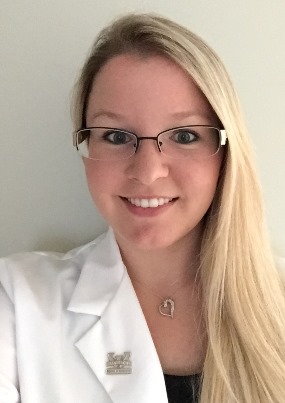
Medical student Molly Belisle was selected to represent Wayne State University in the Michigan Leadership Education in Neurodevelopmental Disabilities fellowship program. Belisle, a second-year medical student in the WSU School of Medicine, is the only representative from WSU.
"I am honored to have been chosen as a member of the first cohort of MI-LEND trainees," Belisle said.
MI-LEND is a new consortium of six Michigan universities, including WSU, Central Michigan University, Michigan State University, the University of Michigan-Ann Arbor, University of Michigan-Dearborn and Western Michigan University. The specialized interdisciplinary certificate program prepares future leaders who will serve children with neurodevelopmental and related disabilities and their families, with a focus on autism.
The consortium, one of 52 LEND programs in the United States, is funded by the U.S. Health Resources and Services Administration's Maternal and Child Health Bureau. The fellowship provides graduate level training designed to improve the health and well-being of individuals with disabilities while also preparing trainees from diverse professional disciplines to assume leadership roles in their respective fields.
In addition to medicine, LEND trainees may include graduate students and pre-and post-doctoral students and fellows in the professions of audiology, dentistry, genetic counseling, health administration, medicine, nursing, nutrition, occupational therapy, physical therapy, psychology, social work, special education and speech-language pathology, as well as advocates and family members of children with disabilities and other special health care needs.
"Current medical education accreditation standards are limited in required competencies related to caring for patients with disabilities. As a result, there are many medical students who may graduate with little to no exposure in disability-related care principles, contributing to health disparities within this population," Belisle said. "The MI-LEND program will provide me the opportunity to learn from experts in the field as well as build a professional network with peers from many disciplines, which I hope to incorporate in my future practice."
The Michigan Developmental Disabilities Institute, or MI-DDI, housed at WSU, is the lead institution for the MI-LEND program. The MI-DDI is directed by Sharon Milberger, Ph.D., who is also director of MI-LEND. "As the University Center of Excellence on Developmental Disabilities for the state of Michigan, MI-DDI/WSU took the lead in the MI-LEND grant submission and establishing and implementing the MI-LEND consortium," Dr. Milberger said.
As this is Michigan's first LEND grant, the inaugural cohort is participating in an accelerated and condensed version of the program. As a long-term trainee of MI-LEND, Belisle must log a minimum of 300 hours of participation -- 100 clinical hours, 100 community hours, 80 didactic hours and 20 hours dedicated to an individualized learning plan -- to complete the program. Long-term trainees who successfully complete the training program receive stipends.
Future cohorts will take place over a full academic year. Recruitment for the 2017-2018 cohort will begin in April 2017 and will expand to 18 long-term trainees across the six universities.
The School of Medicine's Director of Co-Curricular Programs Jennifer Mendez, Ph.D., who initially brought the program to Belisle's attention, will serve as her faculty mentor for the fellowship.
The student joined The Arie Foundation, a School of Medicine student organization, in her first year of medical school, coordinating medical students visiting the homes of families with children with developmental disabilities. The MI-DDI is the partner and sponsor of The Arie Foundation's co-curricular component.
"Recruitment for our first cohort of trainees was extremely competitive as only one trainee was chosen from each participating university. Molly was selected to be part of the inaugural MI-LEND cohort based on her outstanding leadership potential as well as her commitment and passion to improve the health of children with or at risk for neurodevelopmental disabilities," Dr. Milberger said.